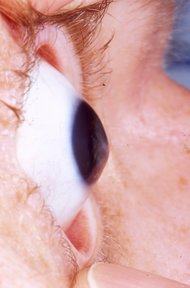Keratoconus
Keratoconus, or "conical cornea" (from kerato- cornea and conus cone), is a degenerative disorder of the eye in which the cornea thins and changes shape to become more conical than the normal parabolic. more...
Symptoms and diagnosis
Keratoconus can cause the vision to become distorted quite badly, with "ghosting", "streaking", and light sensitivity all often reported. The exact nature of the visual distortion introduced by keratoconus is most clearly seen with a high contrast field such as a point of light on a dark background – instead of seeing one point the person may see over 100 images spread out in a complex and random pattern. The pattern does not change from day to day, but over the seasons it often takes on new forms. Doctors tend not to ask exactly what the patient sees, but rather test the vision on a standard Snellen chart of progressively smaller letters. Definitive diagnosis is obtained using corneal topography, a non-invasive visualization of the shape of the surface of the cornea.
The visual distortion comes from two sources, one being the irregular deformation of the surface of the cornea; the other being scarring that occurs on its exposed highpoints. Although some think the scarring is from abrasion by contact lenses, the phenomenon also appears in those who do not use lenses and as such appears to be an aspect of the corneal degradation.
Keratoconus and the associated vision loss, if in both eyes, can affect the person's ability to legally drive a car and function normally. Corrective lenses though, in most cases, allow the person to still drive a car.
Prevalence and cause
The National Eye Institute reports that keratoconus is the most common eye dystrophy in the United States, affecting approximately 1 in every 2,000 Americans, but some reports place the figure as high as 1 in every 500.
Keratoconus seems to have genetic components. Keratoconus is also diagnosed more often in people with Down Syndrome, though the reasons for this link have not yet been determined. Keratoconus has been associated with atopic diseases, which include asthma, allergies, and eczema, and it is not uncommon for several or all of these diseases to affect one person. Science has no definitive explanation of what causes keratoconus, however a number of studies suggest that eye rubbing may contribute to its development.
Read more at Wikipedia.org



